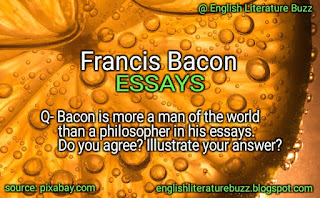Francis Bacon: Philosopher or a Moralist
 |
| Pixabay.com |
There is no doubt that the essays of Bacon are a treasure-house of what is called worldly wisdom. Worldly wisdom means the kind of wisdom that is necessary for achieving worldly success. Worldly wisdom does not imply any deep philosophy or any ideal morality. It simply means the art or the technique that a man should employ to achieve success in his life. It therefore implies shrewdness, sagacity, tact, foresight, judgement of character and so on. Bacon's essays are replete with wisdom of this kind. He teaches us the art of how to get on in this world, how to become rich and prosperous, how to rise to high positions, how to gain influence, etc.
It is true that Bacon is a philosopher and a moralist, but it has rightly been pointed out by critics that, in his essays as in his own career, he treated philosophy and morality as being subordinate to worldly success. It is for this reason that the wisdom of his essays is of a somewhat cynical kind.
Bacon is clearly seen in his essays both as a philosopher and as a moralist. A philosopher is, broadly speaking, a person who is deeply interested in the pursuit of truth, while a moralist is a person who teaches human beings the distinction between what is right and what is wrong and urge them to tread the right path only. Bacon appears in this dual role in many of his essays that he has written. In the essay, Of Truth, Bacon says that truth is a supreme good for human beings.
Bacon quotes Lucretius who said that the greatest pleasure for a man was the realization of truth and that, standing upon the vantage ground of truth, a man could survey the errors, falsehoods, and follies prevailing in the world. All these, we might say, are the observation of a philosopher-cum-moralist.
Falsehood brings nothing but disgrace. Quoting Montaigne, he says that, in telling a lie, a man is brave towards God but a toward towards his fellow man. He warns human beings against the punishment which will descend upon them on the doomsday for the falsehoods which they indulge in or practice.
The essay, Of Great Place, contains a large number of moral precepts but these moral precepts, be it noted, are synonymous with worldly wisdom. Like a true moralist, he writes: " In place there is licence to do good and evil, whereof the latter is a curse, for in evil, the best condition is not well, the second not". The whole purpose of a man's efforts should, according to Bacon, be meritorious works.
The essays Of Friendship is the work of a pure utilitarian. Bacon does not speak of friendship in terms, he says that friendship helps a man firstly to disburden his heart and secondly to clear the understanding.
It helps a man to ventilate those secret feelings, desires, and frustrations which would, if suppressed within the heart, cause tension and depression in a man. The advice given by a friend is most reliable.
Bacon seems to suggest that we need friends only for our worldly happiness and worldly good. This is an essay that clearly shows that Bacon's wisdom is of a cynical kind.
Bacon makes a utilitarian approach even to studies. Studies are a source of delight in one's leisure time and solitude. Studies also help to develop one's ability to judge and handle one's affair with ease and success. It is the learned man who can be expected to formulate general plans and policies, and manage the business in its over all aspects.
Reading also fills the mind with new ideas and thoughts and develops the whole personality of a man.
Studies influence a man's character and mould his personality. Different kinds of books have different effects on the reader. History makes a man wise. Poetry develops man's imagination and ingenuity. Mathematics makes a man's mind keen and stable. Logic and rhetoric develops a man's ability to debate and argue. Natural philosophy enables a man to go deep into a subject and Moral philosophy fosters a serious attitude in a man.
Related Topics:
Jonathan Swift: As A Misanthropist
